Individual Assignment on Case Study of Margaret
VerifiedAdded on 2023/06/08
|7
|1614
|131
AI Summary
This individual assignment discusses the case study of Margaret, who is suffering from depression. It covers the symptoms, pathophysiology, risk factors, treatment options, and plan. The treatment plan includes pharmacological and non-pharmacological interventions.
Contribute Materials
Your contribution can guide someone’s learning journey. Share your
documents today.
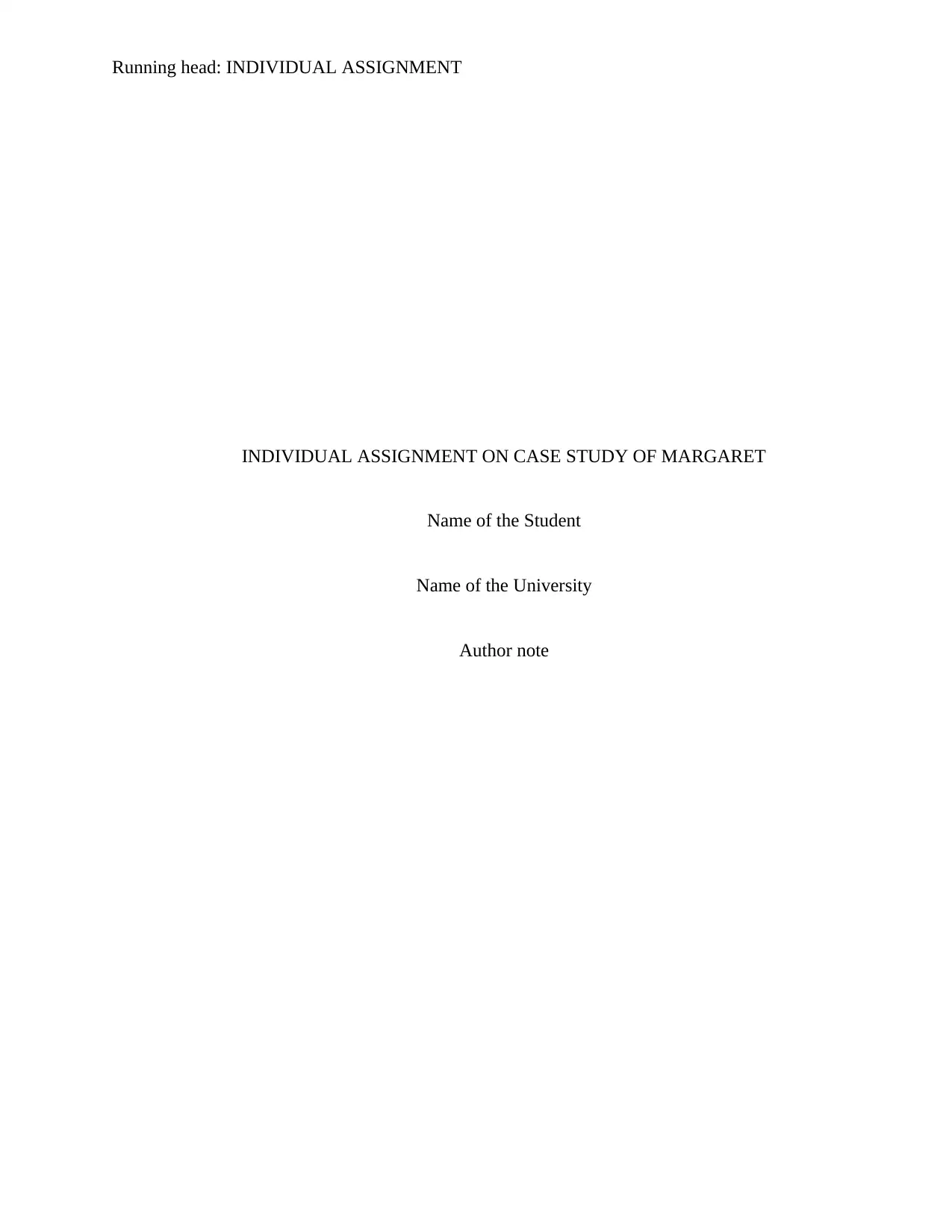
Running head: INDIVIDUAL ASSIGNMENT
INDIVIDUAL ASSIGNMENT ON CASE STUDY OF MARGARET
Name of the Student
Name of the University
Author note
INDIVIDUAL ASSIGNMENT ON CASE STUDY OF MARGARET
Name of the Student
Name of the University
Author note
Secure Best Marks with AI Grader
Need help grading? Try our AI Grader for instant feedback on your assignments.
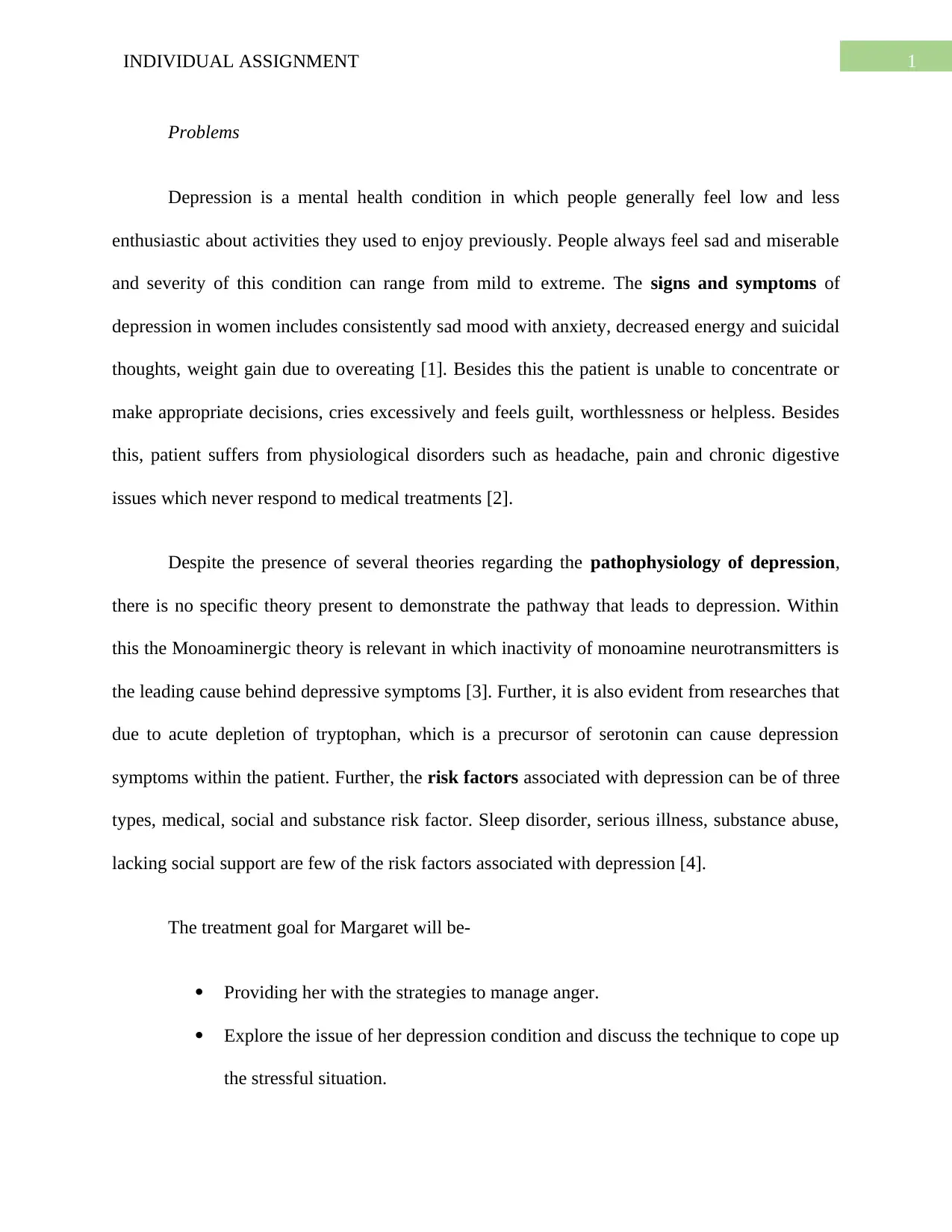
1INDIVIDUAL ASSIGNMENT
Problems
Depression is a mental health condition in which people generally feel low and less
enthusiastic about activities they used to enjoy previously. People always feel sad and miserable
and severity of this condition can range from mild to extreme. The signs and symptoms of
depression in women includes consistently sad mood with anxiety, decreased energy and suicidal
thoughts, weight gain due to overeating [1]. Besides this the patient is unable to concentrate or
make appropriate decisions, cries excessively and feels guilt, worthlessness or helpless. Besides
this, patient suffers from physiological disorders such as headache, pain and chronic digestive
issues which never respond to medical treatments [2].
Despite the presence of several theories regarding the pathophysiology of depression,
there is no specific theory present to demonstrate the pathway that leads to depression. Within
this the Monoaminergic theory is relevant in which inactivity of monoamine neurotransmitters is
the leading cause behind depressive symptoms [3]. Further, it is also evident from researches that
due to acute depletion of tryptophan, which is a precursor of serotonin can cause depression
symptoms within the patient. Further, the risk factors associated with depression can be of three
types, medical, social and substance risk factor. Sleep disorder, serious illness, substance abuse,
lacking social support are few of the risk factors associated with depression [4].
The treatment goal for Margaret will be-
Providing her with the strategies to manage anger.
Explore the issue of her depression condition and discuss the technique to cope up
the stressful situation.
Problems
Depression is a mental health condition in which people generally feel low and less
enthusiastic about activities they used to enjoy previously. People always feel sad and miserable
and severity of this condition can range from mild to extreme. The signs and symptoms of
depression in women includes consistently sad mood with anxiety, decreased energy and suicidal
thoughts, weight gain due to overeating [1]. Besides this the patient is unable to concentrate or
make appropriate decisions, cries excessively and feels guilt, worthlessness or helpless. Besides
this, patient suffers from physiological disorders such as headache, pain and chronic digestive
issues which never respond to medical treatments [2].
Despite the presence of several theories regarding the pathophysiology of depression,
there is no specific theory present to demonstrate the pathway that leads to depression. Within
this the Monoaminergic theory is relevant in which inactivity of monoamine neurotransmitters is
the leading cause behind depressive symptoms [3]. Further, it is also evident from researches that
due to acute depletion of tryptophan, which is a precursor of serotonin can cause depression
symptoms within the patient. Further, the risk factors associated with depression can be of three
types, medical, social and substance risk factor. Sleep disorder, serious illness, substance abuse,
lacking social support are few of the risk factors associated with depression [4].
The treatment goal for Margaret will be-
Providing her with the strategies to manage anger.
Explore the issue of her depression condition and discuss the technique to cope up
the stressful situation.
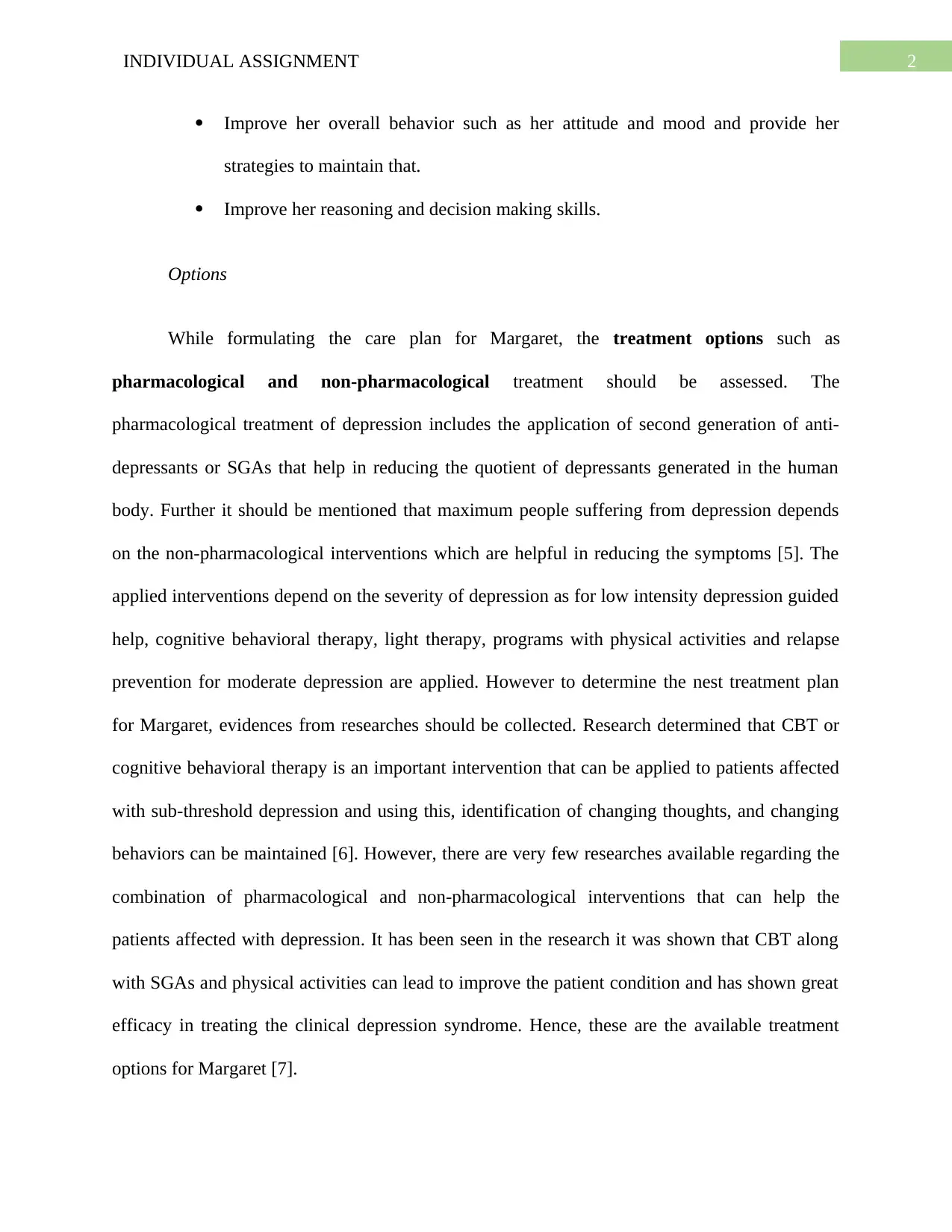
2INDIVIDUAL ASSIGNMENT
Improve her overall behavior such as her attitude and mood and provide her
strategies to maintain that.
Improve her reasoning and decision making skills.
Options
While formulating the care plan for Margaret, the treatment options such as
pharmacological and non-pharmacological treatment should be assessed. The
pharmacological treatment of depression includes the application of second generation of anti-
depressants or SGAs that help in reducing the quotient of depressants generated in the human
body. Further it should be mentioned that maximum people suffering from depression depends
on the non-pharmacological interventions which are helpful in reducing the symptoms [5]. The
applied interventions depend on the severity of depression as for low intensity depression guided
help, cognitive behavioral therapy, light therapy, programs with physical activities and relapse
prevention for moderate depression are applied. However to determine the nest treatment plan
for Margaret, evidences from researches should be collected. Research determined that CBT or
cognitive behavioral therapy is an important intervention that can be applied to patients affected
with sub-threshold depression and using this, identification of changing thoughts, and changing
behaviors can be maintained [6]. However, there are very few researches available regarding the
combination of pharmacological and non-pharmacological interventions that can help the
patients affected with depression. It has been seen in the research it was shown that CBT along
with SGAs and physical activities can lead to improve the patient condition and has shown great
efficacy in treating the clinical depression syndrome. Hence, these are the available treatment
options for Margaret [7].
Improve her overall behavior such as her attitude and mood and provide her
strategies to maintain that.
Improve her reasoning and decision making skills.
Options
While formulating the care plan for Margaret, the treatment options such as
pharmacological and non-pharmacological treatment should be assessed. The
pharmacological treatment of depression includes the application of second generation of anti-
depressants or SGAs that help in reducing the quotient of depressants generated in the human
body. Further it should be mentioned that maximum people suffering from depression depends
on the non-pharmacological interventions which are helpful in reducing the symptoms [5]. The
applied interventions depend on the severity of depression as for low intensity depression guided
help, cognitive behavioral therapy, light therapy, programs with physical activities and relapse
prevention for moderate depression are applied. However to determine the nest treatment plan
for Margaret, evidences from researches should be collected. Research determined that CBT or
cognitive behavioral therapy is an important intervention that can be applied to patients affected
with sub-threshold depression and using this, identification of changing thoughts, and changing
behaviors can be maintained [6]. However, there are very few researches available regarding the
combination of pharmacological and non-pharmacological interventions that can help the
patients affected with depression. It has been seen in the research it was shown that CBT along
with SGAs and physical activities can lead to improve the patient condition and has shown great
efficacy in treating the clinical depression syndrome. Hence, these are the available treatment
options for Margaret [7].
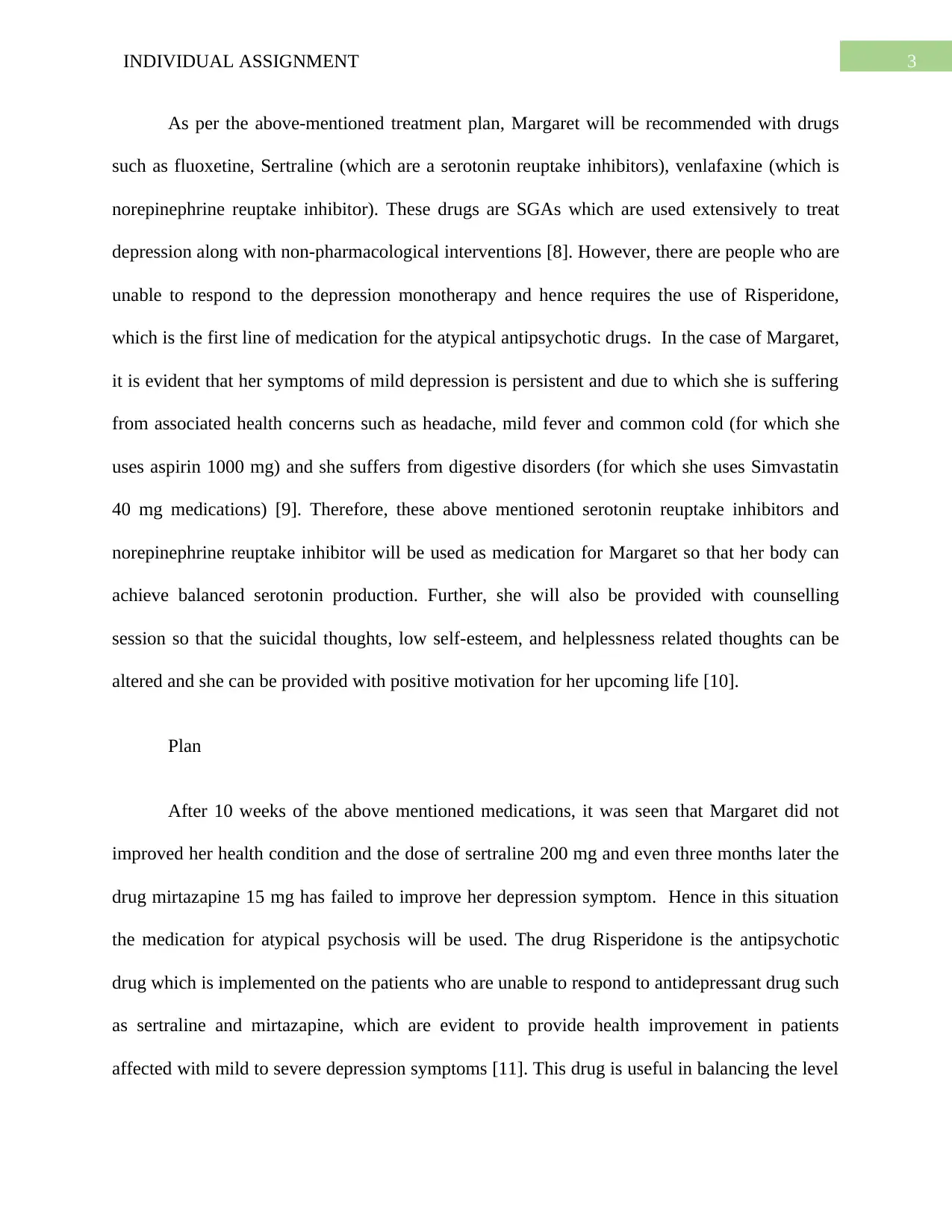
3INDIVIDUAL ASSIGNMENT
As per the above-mentioned treatment plan, Margaret will be recommended with drugs
such as fluoxetine, Sertraline (which are a serotonin reuptake inhibitors), venlafaxine (which is
norepinephrine reuptake inhibitor). These drugs are SGAs which are used extensively to treat
depression along with non-pharmacological interventions [8]. However, there are people who are
unable to respond to the depression monotherapy and hence requires the use of Risperidone,
which is the first line of medication for the atypical antipsychotic drugs. In the case of Margaret,
it is evident that her symptoms of mild depression is persistent and due to which she is suffering
from associated health concerns such as headache, mild fever and common cold (for which she
uses aspirin 1000 mg) and she suffers from digestive disorders (for which she uses Simvastatin
40 mg medications) [9]. Therefore, these above mentioned serotonin reuptake inhibitors and
norepinephrine reuptake inhibitor will be used as medication for Margaret so that her body can
achieve balanced serotonin production. Further, she will also be provided with counselling
session so that the suicidal thoughts, low self-esteem, and helplessness related thoughts can be
altered and she can be provided with positive motivation for her upcoming life [10].
Plan
After 10 weeks of the above mentioned medications, it was seen that Margaret did not
improved her health condition and the dose of sertraline 200 mg and even three months later the
drug mirtazapine 15 mg has failed to improve her depression symptom. Hence in this situation
the medication for atypical psychosis will be used. The drug Risperidone is the antipsychotic
drug which is implemented on the patients who are unable to respond to antidepressant drug such
as sertraline and mirtazapine, which are evident to provide health improvement in patients
affected with mild to severe depression symptoms [11]. This drug is useful in balancing the level
As per the above-mentioned treatment plan, Margaret will be recommended with drugs
such as fluoxetine, Sertraline (which are a serotonin reuptake inhibitors), venlafaxine (which is
norepinephrine reuptake inhibitor). These drugs are SGAs which are used extensively to treat
depression along with non-pharmacological interventions [8]. However, there are people who are
unable to respond to the depression monotherapy and hence requires the use of Risperidone,
which is the first line of medication for the atypical antipsychotic drugs. In the case of Margaret,
it is evident that her symptoms of mild depression is persistent and due to which she is suffering
from associated health concerns such as headache, mild fever and common cold (for which she
uses aspirin 1000 mg) and she suffers from digestive disorders (for which she uses Simvastatin
40 mg medications) [9]. Therefore, these above mentioned serotonin reuptake inhibitors and
norepinephrine reuptake inhibitor will be used as medication for Margaret so that her body can
achieve balanced serotonin production. Further, she will also be provided with counselling
session so that the suicidal thoughts, low self-esteem, and helplessness related thoughts can be
altered and she can be provided with positive motivation for her upcoming life [10].
Plan
After 10 weeks of the above mentioned medications, it was seen that Margaret did not
improved her health condition and the dose of sertraline 200 mg and even three months later the
drug mirtazapine 15 mg has failed to improve her depression symptom. Hence in this situation
the medication for atypical psychosis will be used. The drug Risperidone is the antipsychotic
drug which is implemented on the patients who are unable to respond to antidepressant drug such
as sertraline and mirtazapine, which are evident to provide health improvement in patients
affected with mild to severe depression symptoms [11]. This drug is useful in balancing the level
Secure Best Marks with AI Grader
Need help grading? Try our AI Grader for instant feedback on your assignments.
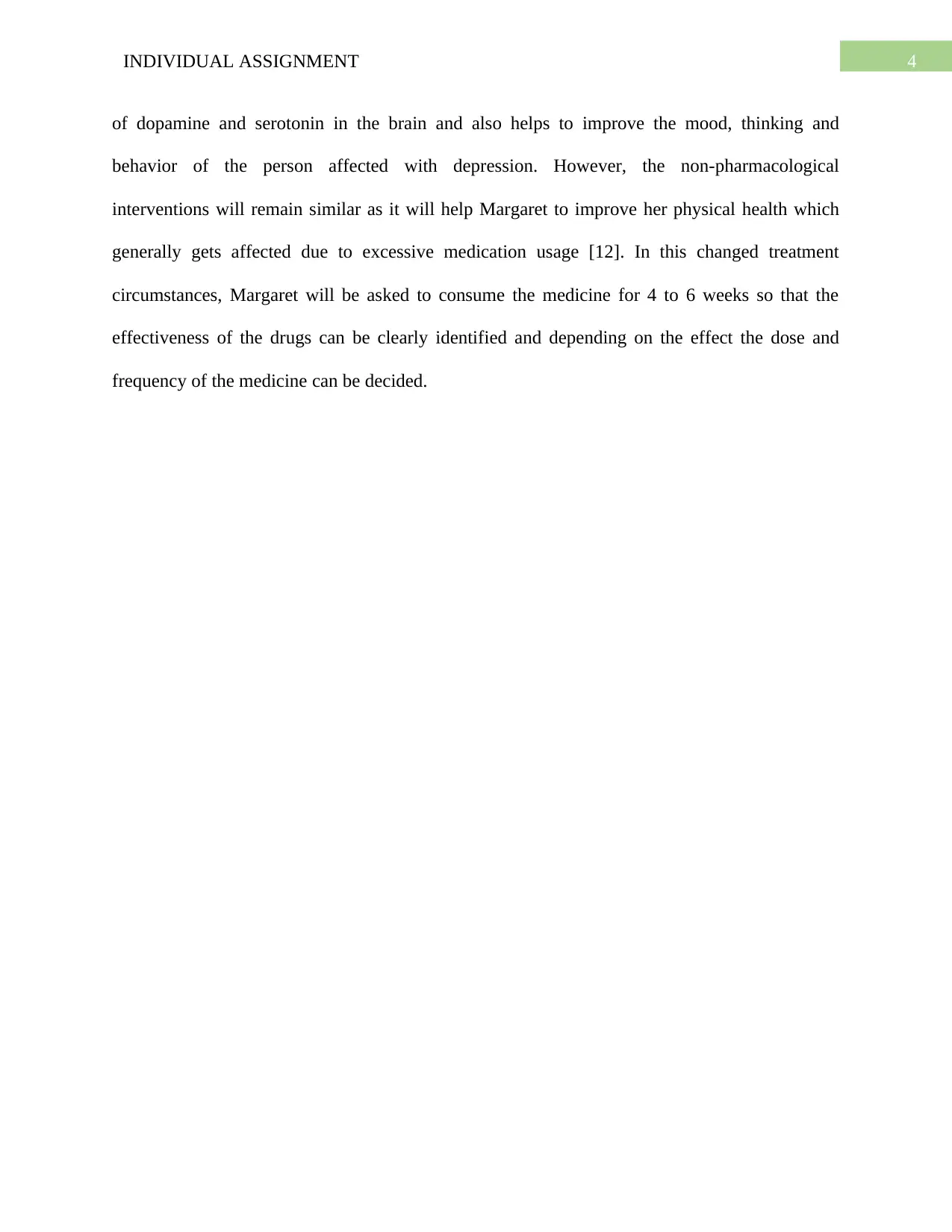
4INDIVIDUAL ASSIGNMENT
of dopamine and serotonin in the brain and also helps to improve the mood, thinking and
behavior of the person affected with depression. However, the non-pharmacological
interventions will remain similar as it will help Margaret to improve her physical health which
generally gets affected due to excessive medication usage [12]. In this changed treatment
circumstances, Margaret will be asked to consume the medicine for 4 to 6 weeks so that the
effectiveness of the drugs can be clearly identified and depending on the effect the dose and
frequency of the medicine can be decided.
of dopamine and serotonin in the brain and also helps to improve the mood, thinking and
behavior of the person affected with depression. However, the non-pharmacological
interventions will remain similar as it will help Margaret to improve her physical health which
generally gets affected due to excessive medication usage [12]. In this changed treatment
circumstances, Margaret will be asked to consume the medicine for 4 to 6 weeks so that the
effectiveness of the drugs can be clearly identified and depending on the effect the dose and
frequency of the medicine can be decided.
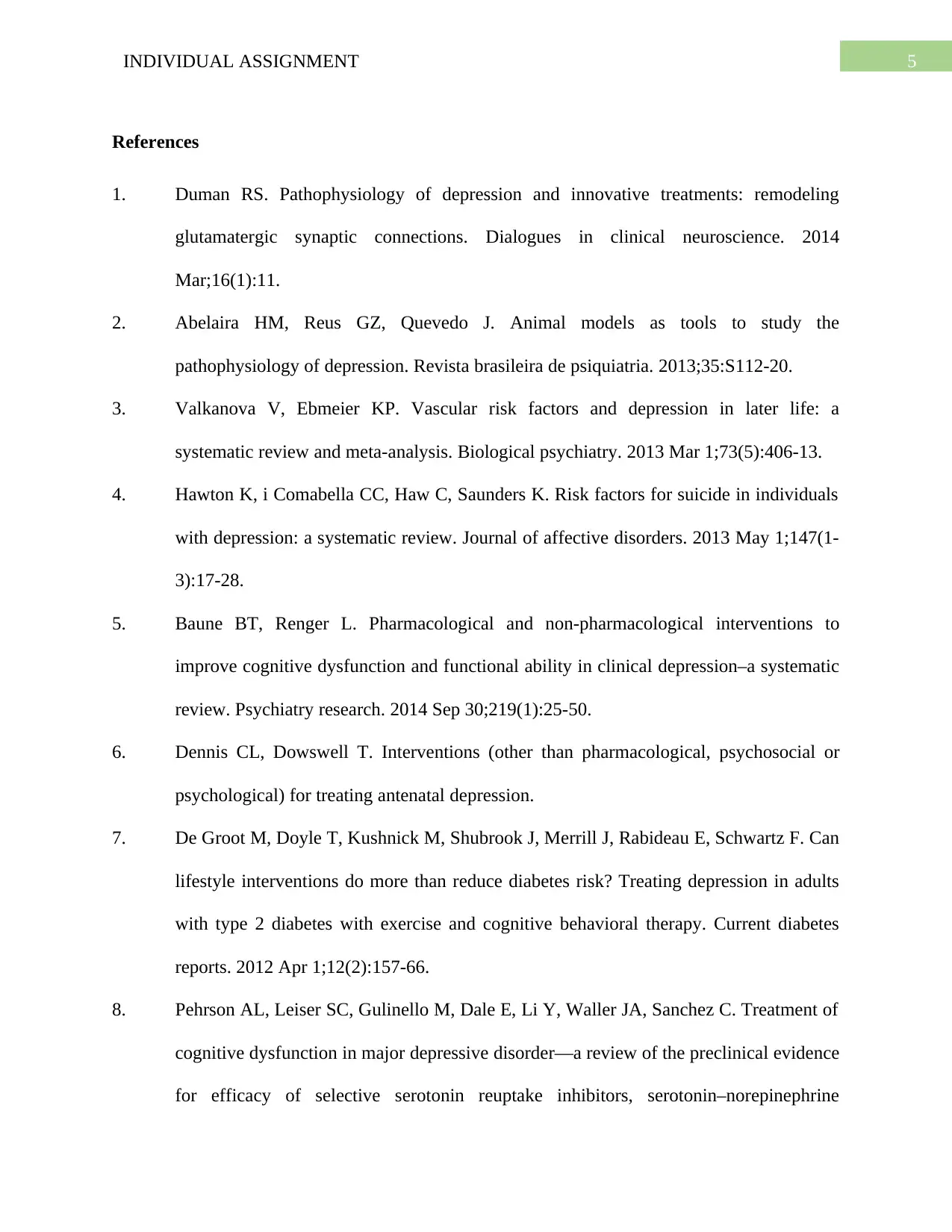
5INDIVIDUAL ASSIGNMENT
References
1. Duman RS. Pathophysiology of depression and innovative treatments: remodeling
glutamatergic synaptic connections. Dialogues in clinical neuroscience. 2014
Mar;16(1):11.
2. Abelaira HM, Reus GZ, Quevedo J. Animal models as tools to study the
pathophysiology of depression. Revista brasileira de psiquiatria. 2013;35:S112-20.
3. Valkanova V, Ebmeier KP. Vascular risk factors and depression in later life: a
systematic review and meta-analysis. Biological psychiatry. 2013 Mar 1;73(5):406-13.
4. Hawton K, i Comabella CC, Haw C, Saunders K. Risk factors for suicide in individuals
with depression: a systematic review. Journal of affective disorders. 2013 May 1;147(1-
3):17-28.
5. Baune BT, Renger L. Pharmacological and non-pharmacological interventions to
improve cognitive dysfunction and functional ability in clinical depression–a systematic
review. Psychiatry research. 2014 Sep 30;219(1):25-50.
6. Dennis CL, Dowswell T. Interventions (other than pharmacological, psychosocial or
psychological) for treating antenatal depression.
7. De Groot M, Doyle T, Kushnick M, Shubrook J, Merrill J, Rabideau E, Schwartz F. Can
lifestyle interventions do more than reduce diabetes risk? Treating depression in adults
with type 2 diabetes with exercise and cognitive behavioral therapy. Current diabetes
reports. 2012 Apr 1;12(2):157-66.
8. Pehrson AL, Leiser SC, Gulinello M, Dale E, Li Y, Waller JA, Sanchez C. Treatment of
cognitive dysfunction in major depressive disorder—a review of the preclinical evidence
for efficacy of selective serotonin reuptake inhibitors, serotonin–norepinephrine
References
1. Duman RS. Pathophysiology of depression and innovative treatments: remodeling
glutamatergic synaptic connections. Dialogues in clinical neuroscience. 2014
Mar;16(1):11.
2. Abelaira HM, Reus GZ, Quevedo J. Animal models as tools to study the
pathophysiology of depression. Revista brasileira de psiquiatria. 2013;35:S112-20.
3. Valkanova V, Ebmeier KP. Vascular risk factors and depression in later life: a
systematic review and meta-analysis. Biological psychiatry. 2013 Mar 1;73(5):406-13.
4. Hawton K, i Comabella CC, Haw C, Saunders K. Risk factors for suicide in individuals
with depression: a systematic review. Journal of affective disorders. 2013 May 1;147(1-
3):17-28.
5. Baune BT, Renger L. Pharmacological and non-pharmacological interventions to
improve cognitive dysfunction and functional ability in clinical depression–a systematic
review. Psychiatry research. 2014 Sep 30;219(1):25-50.
6. Dennis CL, Dowswell T. Interventions (other than pharmacological, psychosocial or
psychological) for treating antenatal depression.
7. De Groot M, Doyle T, Kushnick M, Shubrook J, Merrill J, Rabideau E, Schwartz F. Can
lifestyle interventions do more than reduce diabetes risk? Treating depression in adults
with type 2 diabetes with exercise and cognitive behavioral therapy. Current diabetes
reports. 2012 Apr 1;12(2):157-66.
8. Pehrson AL, Leiser SC, Gulinello M, Dale E, Li Y, Waller JA, Sanchez C. Treatment of
cognitive dysfunction in major depressive disorder—a review of the preclinical evidence
for efficacy of selective serotonin reuptake inhibitors, serotonin–norepinephrine
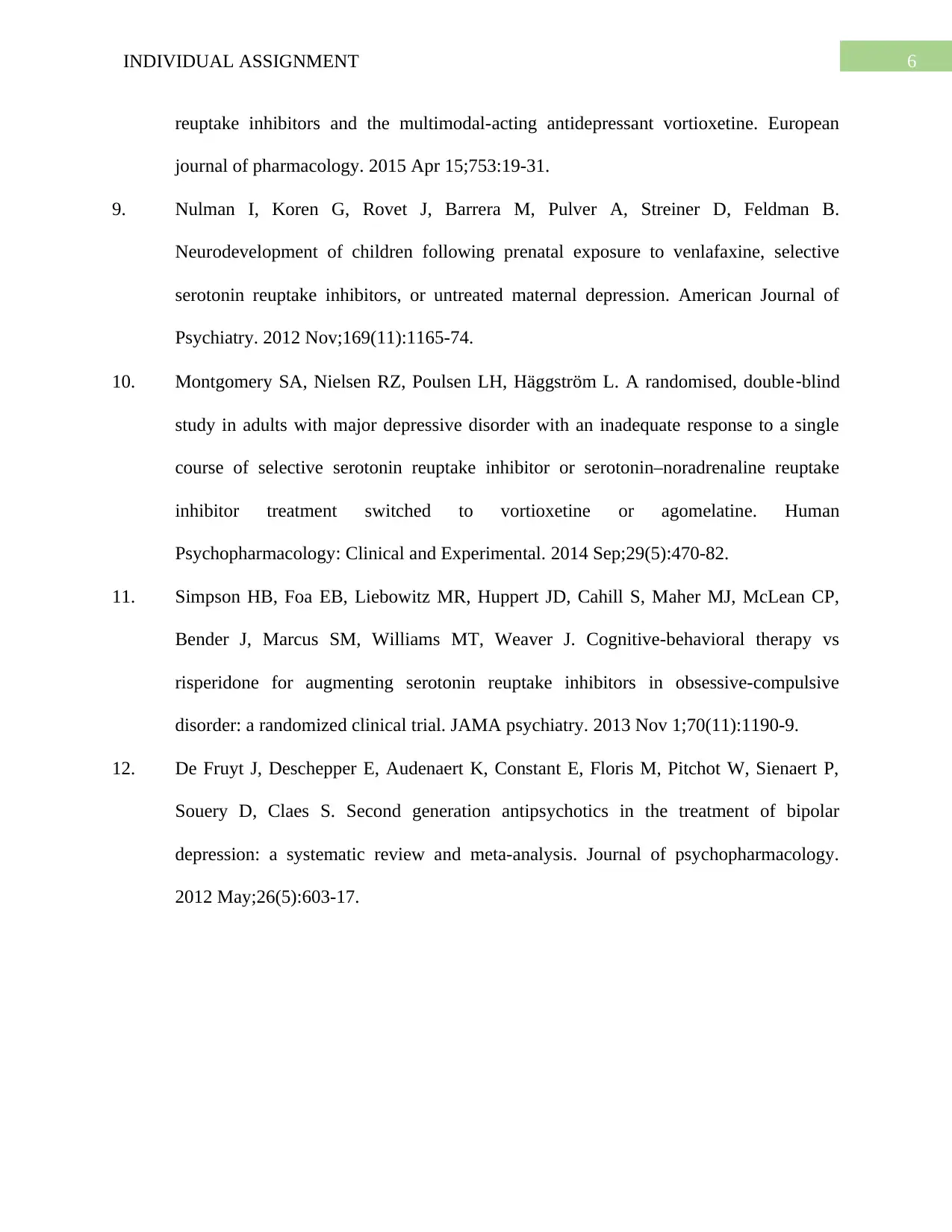
6INDIVIDUAL ASSIGNMENT
reuptake inhibitors and the multimodal-acting antidepressant vortioxetine. European
journal of pharmacology. 2015 Apr 15;753:19-31.
9. Nulman I, Koren G, Rovet J, Barrera M, Pulver A, Streiner D, Feldman B.
Neurodevelopment of children following prenatal exposure to venlafaxine, selective
serotonin reuptake inhibitors, or untreated maternal depression. American Journal of
Psychiatry. 2012 Nov;169(11):1165-74.
10. Montgomery SA, Nielsen RZ, Poulsen LH, Häggström L. A randomised, double‐blind
study in adults with major depressive disorder with an inadequate response to a single
course of selective serotonin reuptake inhibitor or serotonin–noradrenaline reuptake
inhibitor treatment switched to vortioxetine or agomelatine. Human
Psychopharmacology: Clinical and Experimental. 2014 Sep;29(5):470-82.
11. Simpson HB, Foa EB, Liebowitz MR, Huppert JD, Cahill S, Maher MJ, McLean CP,
Bender J, Marcus SM, Williams MT, Weaver J. Cognitive-behavioral therapy vs
risperidone for augmenting serotonin reuptake inhibitors in obsessive-compulsive
disorder: a randomized clinical trial. JAMA psychiatry. 2013 Nov 1;70(11):1190-9.
12. De Fruyt J, Deschepper E, Audenaert K, Constant E, Floris M, Pitchot W, Sienaert P,
Souery D, Claes S. Second generation antipsychotics in the treatment of bipolar
depression: a systematic review and meta-analysis. Journal of psychopharmacology.
2012 May;26(5):603-17.
reuptake inhibitors and the multimodal-acting antidepressant vortioxetine. European
journal of pharmacology. 2015 Apr 15;753:19-31.
9. Nulman I, Koren G, Rovet J, Barrera M, Pulver A, Streiner D, Feldman B.
Neurodevelopment of children following prenatal exposure to venlafaxine, selective
serotonin reuptake inhibitors, or untreated maternal depression. American Journal of
Psychiatry. 2012 Nov;169(11):1165-74.
10. Montgomery SA, Nielsen RZ, Poulsen LH, Häggström L. A randomised, double‐blind
study in adults with major depressive disorder with an inadequate response to a single
course of selective serotonin reuptake inhibitor or serotonin–noradrenaline reuptake
inhibitor treatment switched to vortioxetine or agomelatine. Human
Psychopharmacology: Clinical and Experimental. 2014 Sep;29(5):470-82.
11. Simpson HB, Foa EB, Liebowitz MR, Huppert JD, Cahill S, Maher MJ, McLean CP,
Bender J, Marcus SM, Williams MT, Weaver J. Cognitive-behavioral therapy vs
risperidone for augmenting serotonin reuptake inhibitors in obsessive-compulsive
disorder: a randomized clinical trial. JAMA psychiatry. 2013 Nov 1;70(11):1190-9.
12. De Fruyt J, Deschepper E, Audenaert K, Constant E, Floris M, Pitchot W, Sienaert P,
Souery D, Claes S. Second generation antipsychotics in the treatment of bipolar
depression: a systematic review and meta-analysis. Journal of psychopharmacology.
2012 May;26(5):603-17.
1 out of 7
Related Documents
Your All-in-One AI-Powered Toolkit for Academic Success.
+13062052269
info@desklib.com
Available 24*7 on WhatsApp / Email
![[object Object]](/_next/static/media/star-bottom.7253800d.svg)
Unlock your academic potential
© 2024 | Zucol Services PVT LTD | All rights reserved.





